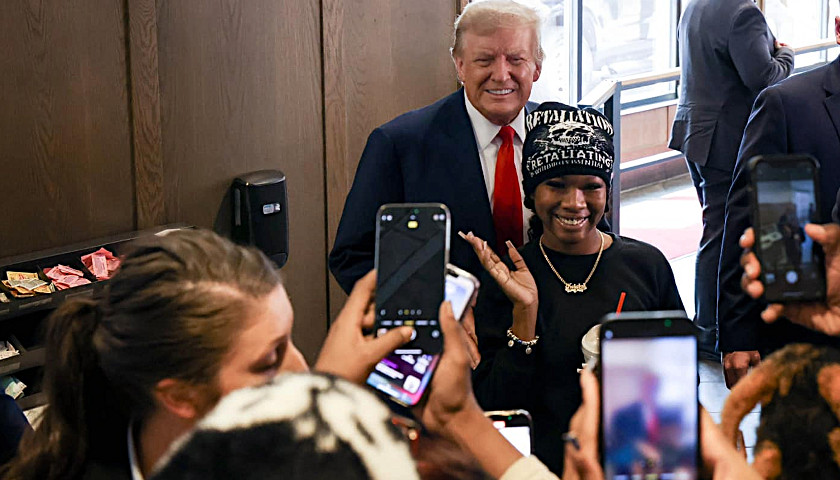Live from Music Row Monday morning on The Tennessee Star Report with Michael Patrick Leahy – broadcast on Nashville’s Talk Radio 98.3 and 1510 WLAC weekdays from 5:00 a.m. to 8:00 a.m. – host Leahy welcomed the original all-star panelist Crom Carmichael to the studio.
At the end of the second hour, Carmichael weighed in on institutional constraints and the Democratic Party’s party disdain for constraints. He added that here in Nashville, ‘Mayor Cooper and his and his ilk are trying to thwart the will of the voters and thwart the institutional constraints that the that our Charter provides.’
(Amy Coney Barrett clip plays)
Leahy: And that is Amy Coney Barrett Saturday after the president nominated her for the Supreme Court. Crom, it looks like they have the votes to confirm her. She seems like a very, very solid person, very strong intellectually with good character, seven kids, two adopted from Haiti. What’s the left going to do with this?
Carmichael: Well, she may be better than all of those things that you’ve just said. She may be beyond just really good. She may end up being great. Let me express why, by the way, she shall now be known as ACB.
Leahy: ACB. As opposed to RBG.
Carmichael: Or an AOC. So that we now have an ACB.
Leahy: ACB, AOC, RGB.
Carmichael: I will point out that the Babylon Bee had a headline that Democrats sent to me by a good friend of mine. So the Democrats moved to have Ginsburg’s Dying Wishes to Replace the Constitution.
Leahy: That’s what they want.
Carmichael: Which if you stop that, if that’s what they want, me what they’re saying.
Leahy: I love the Babylon Bee. By the way, it’s a parody site and yet and it will do headlines, and you’ll see the same story like an hour later on CNN. (Laughter)
Carmichael: Yeah, they’re prescient for sure. But here’s what’s interesting. Here’s what she says. This is 2017. She wrote a faithful judge to resist the temptation to conflate the meaning of the constitution, a judge’s own political preference.
She goes on to say that requires fidelity to the original public meaning, which serves as a constraint upon judicial decision-making. And I want to focus on that one point. And that is what we’ve been talking about now for a year. And you may have been talking about it for much longer than that, is the importance of institutional constraints. Mayor Cooper, for example, does not want institutional constraints.
Leahy: No. He wants to have a little dictatorship.
Carmichael: He wants to be a dictator
Leahy: And he wants to hurt people.
Carmichael: Actually he really does. He’s a very mean person. And by the way, really mean people don’t think they are racist. He’s like that racist who where the people say, you’re a racist and don’t even know it. He is truly a mean person and doesn’t even know it because it’s apparently is his nature. And that’s a shame.
But getting back, and the reason I talk about the institutional constraint, the constraining Metro is the voters. The voters have a right if the government errors to have a referendum, so that the voters can constrain the government here in Nashville.
Mayor Cooper and his ilk are trying to thwart the will of the voters and thwart the institutional constraints that our Charter provides. Our constitution was designed to empower a federal government, a national government, and at the same time, to constrain those powers and to limit those powers.
Leahy: Checks and balances.
Carmichael: That’s what it was designed to do. That’s what it was designed to do. And ACB understands that it is enormously important for the Judiciary to recognize and appreciate those constraints upon itself. Because if a Supreme Court, if a majority of the Supreme Court believes that their intellect was superior to the democratic process that the rest of the constitution provides. If they believe that, then they would literally become a legislature in robes that had no accountability and lifetime protection.
Leahy: Well, that’s what the Democrats want.
Carmichael: That is what the Democrats want. Because the Democrats, just as John Cooper, just as Gavin Newsom and just as the Democrats in Washington, they hate the idea that they have to be constrained. They hate it. And that’s because their constituency is the government itself.
Leahy: Yes.
Carmichael: And if you’re going to grow your very own constituency at the expense of everyone who’s not part of that constituency, then you hate the constraints that make you abide by the rule of law. And Nancy Pelosi keeps talking about it. And when one hand starts flying in the air, you know, she’s about to tell an even bigger lie than when her hands aren’t flying in the air.
When she says she prays about Trump. When she says that no person is above the law. Well, she is. That we are a nation of laws not a nation of men. Well, that’s not true. She wants to have us be a nation of men.
Leahy: And women who abuse their power.
Carmichael: I’m using men as the gender-neutral that I’m talking about there, but that’s what but Amy Coney Barrett has a great appreciation for. And her court rulings and her writings on the federal court. I think she’d been on the federal, what is it called the circuit court? Is that what she’s been on most recently Michael? Is that what they call it? Circuit Court of the…
Leahy: Circuit Court of Appeals in Chicago.
Carmichael: I heard regarding Doe versus Purdue University was a very, very well written ruling about sexual harassment and charges of sexual assault on college campuses where they are, where they’re made way more often than not by a female student against a male student and there is no due process.
And she says you can’t possibly have a situation where there is no due process and there’s fairness at the same time. Now, by the way, she wasn’t siding with the male student. She was siding against the university’s process of handling this particular allegation without even talking to the witnesses.
Leahy: Due process is a right. It’s right there in the constitution.
Carmichael: Yeah, but it’s also all about it’s in the constitution for sure. And it’s all about fairness.
Leahy: Yes.
Carmichael: And so then she has written, she wrote an opinion in Cantor versus Barr where, and it was a dissenting opinion. Where her opinion ended up being the opinion that prevailed when it went to the Supreme Court. So the majority held that the government may categorically strip nonviolent felons of their Second Amendment rights. And she says no, you can’t strip all felons.
Leahy: There has to be a process.
Carmichael: There has to be a process for that as well. There are also there are some felons that do not deserve to have their second amendment rights taken away.
Listen to the full second hour here:
– – –
Tune in weekdays from 5:00 – 8:00 a.m. to the Tennessee Star Report with Michael Patrick Leahy on Talk Radio 98.3 FM WLAC 1510. Listen online at iHeart Radio.
Photos “Supreme Court” by TexasGOPVote.com CC BY 2.0 “Nancy Pelosi” by Gage Skidmore CC BY-SA 2.0 “Amy Coney Barrett” by Rachel Malehorn CC BY 3.0








